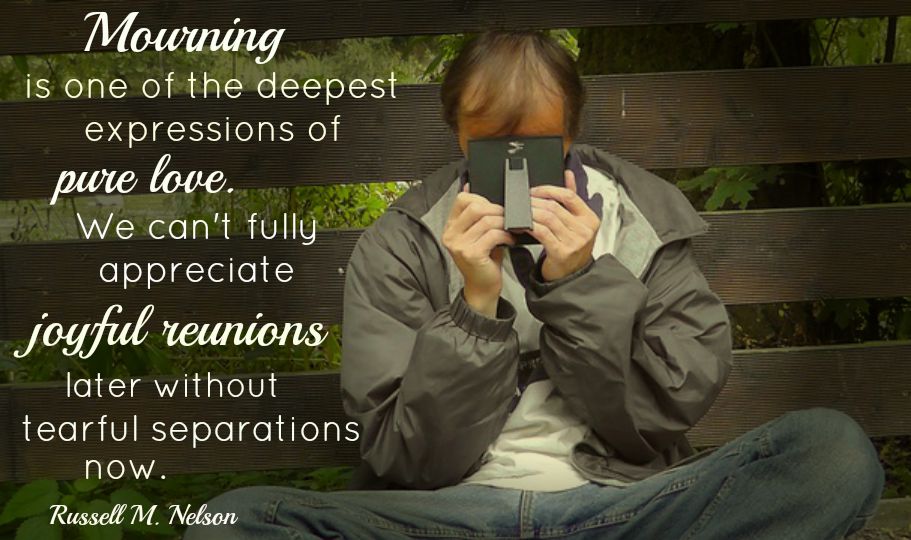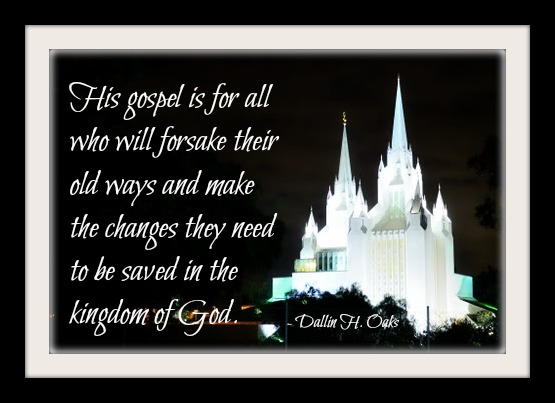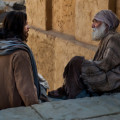The sudden death of a friend or family member underscores how short life really is. When the death is a suicide, it can be even more confusing and traumatic for those who are left behind. Our family came home from a much-needed summer vacation to the news that a friend had apparently taken her own life. Those first few days, I kept waiting for her to call or send a text and say that this was a big joke (not funny) or a mistake or a misunderstanding. As the reality began to truly sink in, I had to deal with the whirlpool of emotions swirling around me…grief, anger, sadness, guilt. Elder M. Russell Ballard said:
The act of taking one’s life is truly a tragedy because this single act leaves so many victims: first the one who dies, then the dozens of others—family and friends—who are left behind, some to face years of deep pain and confusion. The living victims struggle, often desperately, with difficult emotions. …
This has been the case with my friend’s death. As I have started to mentally process this tragedy, there are some things that I wish I had known earlier. There are some things I’m glad I was taught. There are some things that I would have done differently. And there are memories that I will always cherish. How do you find peace in the aftermath of a loved one’s suicide? I can’t speak for others, but I have found peace and comfort in the teachings of The Church of Jesus Christ of Latter-day Saints. The message of the gospel is one of hope—even in the face of such tragedy.
God’s Compassion is Infinite
Perhaps the greatest distress for loved ones who are left behind is the concern about where those who have committed suicide go after they die. Some religions believe that those who commit suicide are eternally damned and can find no forgiveness. Such ideas add further grief and despair for the loved ones left behind. What do Mormons believe about those who commit suicide? The answer is complex, and there is no one-size-fits-all response.
Most people know and understand that killing another human being is wrong. The Ten Commandments state: “Thou shalt not kill” (Exodus 20:13). Modern prophets and Apostles in The Church of Jesus Christ have taught the same thing. The killing of self is no exception. President Spencer W. Kimball taught:
It is a terrible criminal act for a person to go out and shorten his life by suicide. (Teachings of Spencer W. Kimball, ed. Edward L. Kimball, Salt Lake City: Bookcraft, 1982, p. 187.)
Herein lies one of the deepest challenges for those who are left behind. Of this, Elder Ballard said:
I feel that judgment for sin is not always as cut-and-dried as some of us seem to think. The Lord said, “Thou shalt not kill.” Does that mean that every person who kills will be condemned, no matter the circumstances? Civil law recognizes that there are gradations in this matter—from accidental manslaughter to self-defense to first-degree murder. I feel that the Lord also recognizes differences in intent and circumstances: Was the person who took his life mentally ill? Was he or she so deeply depressed as to be unbalanced or otherwise emotionally disturbed? Was the suicide a tragic, pitiful call for help that went unheeded too long or progressed faster than the victim intended? Did he or she somehow not understand the seriousness of the act? Was he or she suffering from a chemical imbalance that led to despair and a loss of self-control?
Obviously, we do not know the full circumstances surrounding every suicide. …
Suicide is a sin—a very grievous one, yet the Lord will not judge the person who commits that sin strictly by the act itself. The Lord will look at that person’s circumstances and the degree of his accountability at the time of the act.
The love of God is infinite and universal. President Dieter F. Uchtdorf taught:
Think of the purest, most all-consuming love you can imagine. Now multiply that love by an infinite amount—that is the measure of God’s love for you. … We are important to God not because of our résumé but because we are His children. He loves every one of us, even those who are flawed, rejected, awkward, sorrowful, or broken. God’s love is so great that He loves even the proud, the selfish, the arrogant, and the wicked.
What this means is that, regardless of our current state, there is hope for us. No matter our distress, no matter our sorrow, no matter our mistakes, our infinitely compassionate Heavenly Father desires that we draw near to Him so that He can draw near to us.
Even in our times of grief, we can take comfort in the knowledge that God knows us—and He knows our loved ones. He knows our hearts, our intentions, our struggles, our pains. I can’t condone what my friend did, nor can I condemn her for it. But I can see her as the Savior does, and have compassion.
We are Loved More Than We Know
I think we would be amazed if we really knew how much each one of us is loved—not only by God but also by those around us. And we are also loved by those who have gone before us and are anxiously awaiting our return. President Russell M. Nelson said,
… We mourn for those loved and lost. Mourning is one of the deepest expressions of pure love. … We can’t fully appreciate joyful reunions later without tearful separations now. The only way to take sorrow out of death is to take love out of life. …
Our limited perspective would be enlarged if we could witness the reunion on the other side of the veil, when doors of death open to those returning home. Such was the vision of the psalmist who wrote, “Precious in the sight of the Lord is the death of his saints.” (Psalms 116:15)
My friend died in a secluded park without a living soul around. But I believe that she was not alone. Elder Jeffrey R. Holland said,
From the beginning down through the dispensations, God has used angels as His emissaries in conveying love and concern for His children. … Usually such beings are not seen. Sometimes they are. But seen or unseen they are always near. Sometimes their assignments are very grand and have significance for the whole world. Sometimes the messages are more private. … But most often it is to comfort, to provide some form of merciful attention, guidance in difficult times. …
In the course of life all of us spend time in “dark and dreary” places, wildernesses, circumstances of sorrow or fear or discouragement. … But I testify that angels are still sent to help us, even as they were sent to help … the prophets, and indeed to help the Savior of the world Himself.
My heart aches for the despair she must have felt when she chose to take her own life. But I believe that in her darkest hours, there were angels around her, even if she could not see them.
Death is Not the End
When a life is cut short by unexpected death, it is important to remember that Heavenly Father has a plan for His children. President Nelson said,
Life does not begin with birth, nor does it end with death. Prior to our birth, we dwelled as spirit children with our Father in Heaven. There we eagerly anticipated the possibility of coming to earth and obtaining a physical body. Knowingly we wanted the risks of mortality, which would allow the exercise of agency and accountability. “This life [was to become] a probationary state; a time to prepare to meet God.” (Alma 12:24.) But we regarded the returning home as the best part of that long-awaited trip, just as we do now. Before embarking on any journey, we like to have some assurance of a round-trip ticket. Returning from earth to life in our heavenly home requires passage through—and not around—the doors of death. We were born to die, and we die to live. (See 2 Corinthians 6:9.) As seedlings of God, we barely blossom on earth; we fully flower in heaven.
One of the purposes of life on earth was to come and obtain a physical body. Death is the separation of the body and the spirit. But the spirit lives on. President Joseph F. Smith taught:
The spirits of all men, as soon as they depart from this mortal body, whether they are good or evil, … are taken home to that God who gave them life, where there is a separation, a partial judgment, and the spirits of those who are righteous are received into a state of happiness which is called paradise, a state of rest, a state of peace, where they expand in wisdom, where they have respite from all their troubles, and where care and sorrow do not annoy. (Joseph F. Smith, Gospel Doctrine, 448).
We also came to earth to be tried and tested and to see if we would follow Jesus Christ in all things. The taking of one’s own life cuts short this probationary period. But that doesn’t mean that death is the end. Elder Ballard explained:
We do not know the extent to which the door is open for these particular people to grow and develop in righteousness until they possibly receive the blessings of exaltation. They committed a very serious sin, and some consequences of it may remain with them throughout eternity. Only our Father in Heaven knows the full answer to the questions our hearts ask regarding those who take their own lives.
But it is clear that hope exists. President Joseph F. Smith learned this important principle near the end of a long life of service to the Church. In vision he saw the work of salvation proceeding among the dead, and wrote:
“I beheld that the faithful elders of this dispensation, when they depart from mortal life, continue their labors in the preaching of the gospel of repentance and redemption, through the sacrifice of the Only Begotten Son of God, among those who are in darkness and under the bondage of sin in the great world of the spirits of the dead.
“The dead who repent will be redeemed, through obedience to the ordinances of the house of God,
“And after they have paid the penalty of their transgressions, and are washed clean, shall receive a reward according to their works, for they are heirs of salvation.” (Doctrine & Covenants 138:57–59; italics added.)
I am grateful for the knowledge that there is hope for my friend. I love her very much, and she touched many lives for good—including those of her own children. I am comforted by the words of Elder Ballard, who said:
Not long ago I was asked to speak at the funeral of a dear friend who had committed suicide. Knowing the person and the circumstances as I did, and researching the doctrine on the subject, I had some difficult moments in preparing for my remarks. I know that any fully rational person who contemplates suicide must realize what a terribly selfish act this is. Peace came to me only when I recognized that only the Lord could administer fair judgment. He alone had all the facts, and only He would know the intent of the heart of my friend. I was reconciled with the idea that a lifetime of goodness and service to others must surely be considered by the Lord in judging the life of a person.
As Elder Dallin H. Oaks said,
… The Final Judgment is not just an evaluation of a sum total of good and evil acts—what we have done. It is an acknowledgment of the final effect of our acts and thoughts—what we have become. It is not enough for anyone just to go through the motions. The commandments, ordinances, and covenants of the gospel are not a list of deposits required to be made in some heavenly account. The gospel of Jesus Christ is a plan that shows us how to become what our Heavenly Father desires us to become.
I know the kind of woman my friend is—and what she wanted to become. Death is not the end for her. I don’t know what consequences she will face because of her decision, but I know that the Lord will be merciful in His judgment of her.
Understanding Depression and the Path to Suicide
There are certain things I wish that I had known before my friend took her life. I didn’t know the risk factors for suicide, so I didn’t recognize them in her. I knew many of her struggles, but she didn’t seem to let them get her down. She always seemed to have a plan of attack. I always figured that I would be able to tell when she was in trouble. But I was wrong. Elder Holland cautioned,
In preventing illness whenever possible, watch for the stress indicators in yourself and in others you may be able to help. As with your automobile, be alert to rising temperatures, excessive speed, or a tank low on fuel. When you face “depletion depression,” make the requisite adjustments. …
I saw these stress indicators in my friend. It’s such a helpless feeling to realize too late that I was seeing warning signs—I just didn’t know how to read them. I don’t know if I could have made a difference in the outcome, but I would have tried.
For those who are dealing with depression or other debilitating emotional or mental challenges—or caring for someone who is, Elder Holland said,
… How do you best respond when mental or emotional challenges confront you or those you love? Above all, never lose faith in your Father in Heaven, who loves you more than you can comprehend. …
Faithfully pursue the time-tested devotional practices that bring the Spirit of the Lord into your life. Seek the counsel of those who hold keys for your spiritual well-being. Ask for and cherish priesthood blessings. Take the sacrament every week, and hold fast to the perfecting promises of the Atonement of Jesus Christ. Believe in miracles. I have seen so many of them come when every other indication would say that hope was lost. Hope is never lost.
It is also important to seek professional help when necessary. Elder Holland said,
If things continue to be debilitating, seek the advice of reputable people with certified training, professional skills, and good values. Be honest with them about your history and your struggles. Prayerfully and responsibly consider the counsel they give and the solutions they prescribe. If you had appendicitis, God would expect you to seek a priesthood blessing and get the best medical care available. So too with emotional disorders.
Speaking to caregivers, Elder Holland said,
… Try not to be overwhelmed with the size of your task. Don’t assume you can fix everything, but fix what you can. If those are only small victories, be grateful for them and be patient.
… In your devoted effort to assist with another’s health, do not destroy your own. In all these things be wise. Do not run faster than you have strength. Whatever else you may or may not be able to provide, you can offer your prayers and you can give “love unfeigned.”
Trials, challenges and adversity are part of life on earth. And they can seem overwhelming and insurmountable. But Elder Holland reminds us:
… Let us remember that through any illness or difficult challenge, there is still much in life to be hopeful about and grateful for. We are infinitely more than our limitations or our afflictions!
Whatever your struggle… —mental or emotional or physical or otherwise—do not vote against the preciousness of life by ending it! Trust in God. Hold on in His love. Know that one day the dawn will break brightly and all shadows of mortality will flee. Though we may feel we are “like a broken vessel,” as the Psalmist says, we must remember, that vessel is in the hands of the divine potter. Broken minds can be healed just the way broken bones and broken hearts are healed. While God is at work making those repairs, the rest of us can help by being merciful, nonjudgmental, and kind.
Perhaps the greatest lesson I learned from my friend—in her life and in her death—is to not judge others. President Joseph Smith said:
While one portion of the human race is judging and condemning the other without mercy, the Great Parent of the universe looks upon the whole of the human family with a fatherly care and paternal regard….
Whatever her decisions, she is my friend, and I love her. Had I known the last time I saw her that that was the last time I would see her, I would have hugged her tighter and told her how much she means to me. It is a stark reminder that life on earth is temporary, and we must not take it for granted. But we need to hold tight to those loved ones who are around us—and cherish the memories of those who have passed on.
Resources for those in need include the National Suicide Prevention Lifeline (1-800-273-8255) and LDS Family Services.









my son related a traumatic experience after which he seriously considered taking his life, just before the final stroke his words ( dad i heard a voice who spoke to me and said mita have a prayer have a prayer i got down on my knees and had a prayer and the pain went away) i testify that the Holy Ghost attended my son in the very second He was needed the most irrespective of weather he was rightous or not.